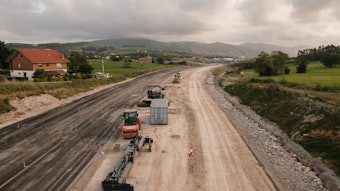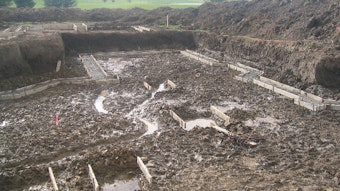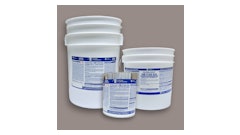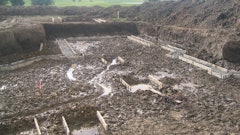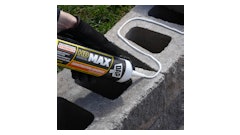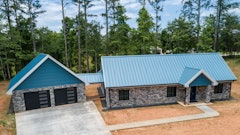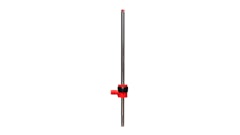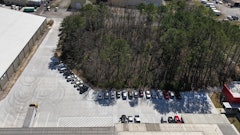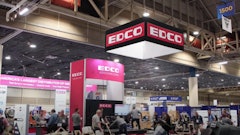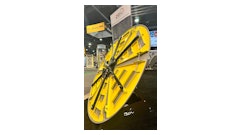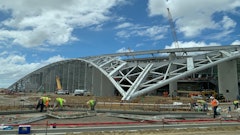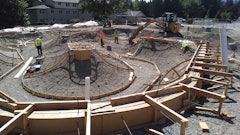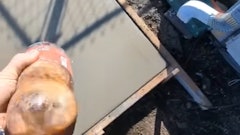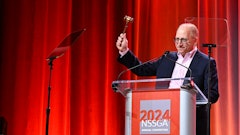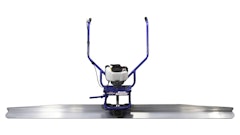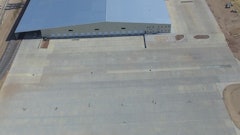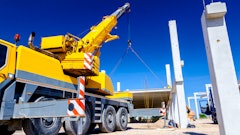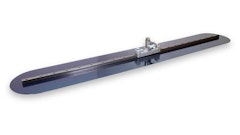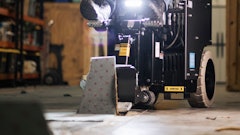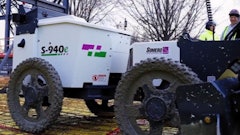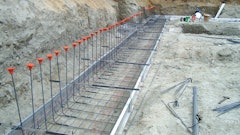
Bruce Neale got his start in the construction business in the 1970s at his father’s carpentry and general contracting firm. Spawned by a customer’s request for a cast-in-place basement, Bruce’s father bought a set of aluminum wall forms and told Bruce to run a walls division of the business and find a way to pay for those forms.
Finding work wasn’t always an easy task since at that time the area around Baltimore, Md., was CMU country. But the cast-in-place concrete market’s reputation was growing and the product’s strength and quality helped Bruce build a network of customers. “After a year, those forms were paid for,” Bruce says.
When Bruce wanted to take the foundation business to the next level, his father agreed to sell him the forms. In 1981, Bruce started Modern Foundations, Woodbine, Md.
It wasn’t long after starting Modern Foundations that Bruce realized the benefits of diversification. Frustrated by scheduling problems and poor workmanship, he added excavation to his line-up of services. “In-house excavation was a way for us to offer expertise to our customers and get rid of any headaches associated with that step,” Bruce says. “We could dig the hole flat and right.”
In addition to simplifying project management for the customer, diversifying also gave Modern Foundations the opportunity to gain more gross sales on each job. Expansion for both the benefit of the customer and Modern Foundations is a philosophy Bruce has run his company by for the last 30 years. “I know time is very important to people,” Bruce says. “I knew the quicker we could make the construction process go, the better it would be for our customers.”
Since getting into excavation, Modern Foundations has also added residential flatwork and waterproofing to its lineup of services. The company even offers two retaining walls systems – Stone Strong and more recently Smart Slope, a hand-set retaining wall system designed to let plants and grass grow between the blocks for a “living wall.”
A family of companies
While busy building his own company, Bruce helped his two sons take advantage of their own opportunities to carve out niches in the concrete business. In 1997, Bruce and his son Jason Neale started Stone Shooters, Inc., a stone placement company. “I saw this service a hard sell to customers,” Bruce admits. “People don’t look for places to spend more money. They can place their own stone, but it’s labor intensive.”
The message Jason needed to convey to potential customers is his service can take an all-day job and reduce it to 1.5 hours of work, all while reducing any potential damage to the foundation wall.
Customers, including Modern Foundations, saw the benefits of the services. Today Stone Shooters, Inc. has nine slinger trucks, a Putzmeister 110 Telebelt and 40-meter pump, and a 28-meter Schwing pump. About 35 percent of Stone Shooters sales is with Modern Foundations.
As luck would have it, the new plot of land Modern Foundations found to call home in 2002 was next door to a small ready-mix plant. When that business went up for sale in 2004, Bruce saw it as a way to put his other son, Mike Neale, in the driver’s seat in his own company. And for Modern Foundations, which at the time was using 30,000 yards of concrete a year, Bruce saw a close relationship with a ready mix plant as a way to eliminate the pouring schedule issues he often had and better ensure mix quality.
Mike, president of MFI Concrete, explains he started the company with five ready-mix trucks and grew that fleet to 15. Just as his father keeps his customers top of mind, so does Mike. “We went with front discharge machines in a rear discharge area. I felt the other ready-mix trucks weren’t servicing the contractor,” Mike says.
Today, about 45 percent of MFI Concrete’s business is with Modern Foundations. The company services contractors all over the area and has certified pervious technicians on staff.
Although all located in the same office, the three businesses remain autonomous. Jason and Mike know the importance of maintaining independent identities for their companies, separate from Modern Foundations. “We walk a fine line,” Jason says. “Many of our customers are our dad’s competitors. We have to keep the companies separate.”
Even with the three companies maintaining their independence, Bruce has found the close relationships with a stone placement company and a ready mix facility has helped him further streamline the concrete construction services Modern Foundations offers.
A recession and a new normal
In June 2006, the recession hit Modern Foundations hard. With 65 percent of the company’s work with production builders, it lost 55 percent of its volume in eight months. “We went from our highest grossing year to rock bottom in a 12-month period,” Bruce explains. “The work with national builders came to a screeching halt, and on the custom homes side the slow down happened over a two-year period.”
Since the slowdown, Modern Foundations has dealt with the same challenges many contractors across the industry have faced — financing was pulled on projects before the company got payment for work it had already done; the company’s local bank was bought out by a larger company and all personal relationships were lost; and the number of available projects to bid has plummeted while the bidding competition on those jobs has become fierce.
Over the last four and a half years, Bruce has been making adjustments to survive and trying to figure out what the new normal will be. The first year Modern Foundations held on to equipment and people, not knowing what the future would hold. Heading into the second year of the slowdown, the company started to reduce the size of its equipment fleet and its staff, laying off some and not replacing those who left. Modern Foundations also implemented benefit and pay cuts.
Since the recession, Bruce has come to realize the importance of a few systems Modern Foundations had been using to increase company-wide efficiencies. For one, the company utilizes a robotic? total station and Trimble’s LM80 layout software for increased accuracy on foundation work. “In the past, on some of our more complicated homes, we could run into some issues with square. But we haven’t had any calls on foundation squareness in last few years,” Bruce says. “That equipment helps us sell jobs when our customers know we do our own layout.”
Fleet costs are one of the leading expenses for any construction company, and Modern Foundations found a way to reduce those costs is with GPS tracking on its trucks. The company can monitor travel efficiencies to help employees get from point A to point B in the best was possible. Since employees know the trucks are tracked, issues with equipment misuse and speeding have decreased.
Modern Foundations also runs a fleet maintenance program. Maintenance intervals are tracked through mileage at the office fueling station. An employee cannot get fuel for a truck if it has reached a maintenance interval. Bruce says the system eases DOT commercial vehicle reporting and reduces repair orders and fines. He adds, “Maintenance tracking allows us to keep our maintenance staff at a minimum — we are just more efficient.”
The fleet programs have also put dollars back in Modern Foundations’ coffers. “We got our insurance company to include us in a rebate program. When we could demonstrate our safety emphasis on driving they saw it as less exposure to them, so at the end of the year we can get something back. One year we received $40,000 back on an annual fleet insurance premium of $400,000,” Bruce says.
The energy efficiency frontier
In its search for the new normal, Modern Foundations found an increasing customer demand for energy efficient homes. The company has offered insulated walls for several years, but in 2010 it connected with an experienced ICF builder in order to offer even more options to its customers.
“We want to become a turn-key operation to provide insulated concrete to our customers,” Bruce explains. “It’s more than just ICFs. We offer any system the customer wants and makes sense. Thermomass, ThermaEZE, T-Rock, Lite Deck – we are trained and approved to install all these products. We want our customers to know that we are a concrete company that can offer expertise in this type of construction. For instance, we know when it’s the right time to place with a conveyor and to place with a pump. And our close relationship with a ready-mix supplier will help us get the concrete supplied at the correct intervals because we know you have to pour an ICF wall slowly.”
The company recently finished its first energy efficient home project since emphasizing this line of work. Last year the company submitted an insulated foundation and decks bid for a 12,000-square-foot custom home. Modern Foundations didn’t win the foundation bid, but they were successful in planting an idea in the homeowner’s head. When the homeowner’s project got delayed, he thought more about energy efficiency and approached Modern Foundations about his options in an above-grade concrete home.
For Modern Foundations, the project went from a rejected $67,000 insulated foundations and decks bid to a $234,000 insulated concrete shell and decks project. The home features rooms under the garage (ideal for a home theater) and exterior porches (ideal for wine cellars and safe rooms). Bruce says these spaces are some of the least expensive ways a homeowner can increase square footage, and these rooms are an add-on for a foundation contractor’s bid.
“To build an energy efficient home, you need to start in the basement and build up,” Bruce continues. “Geothermal heating, insulated foundation walls — all that starts in the foundations. Homeowners may not use those features right away, but they need to know they are hard to retrofit.”
A move into the energy efficient building market has proved a good one for Modern Foundations. Bruce says the company is currently negotiating five home projects right now. “People are more focused on energy costs and future energy costs,” he says.
Bruce expects Modern Foundations to see a 15 percent increase in gross revenues in 2011 compared to 2010 numbers; part of that increase will come from energy efficient building. So, as he has always done throughout Modern Foundations’ 30-year history, Bruce has been able to find a way to expand the services he offers customers while finding ways to keep his crews busier on each project.




